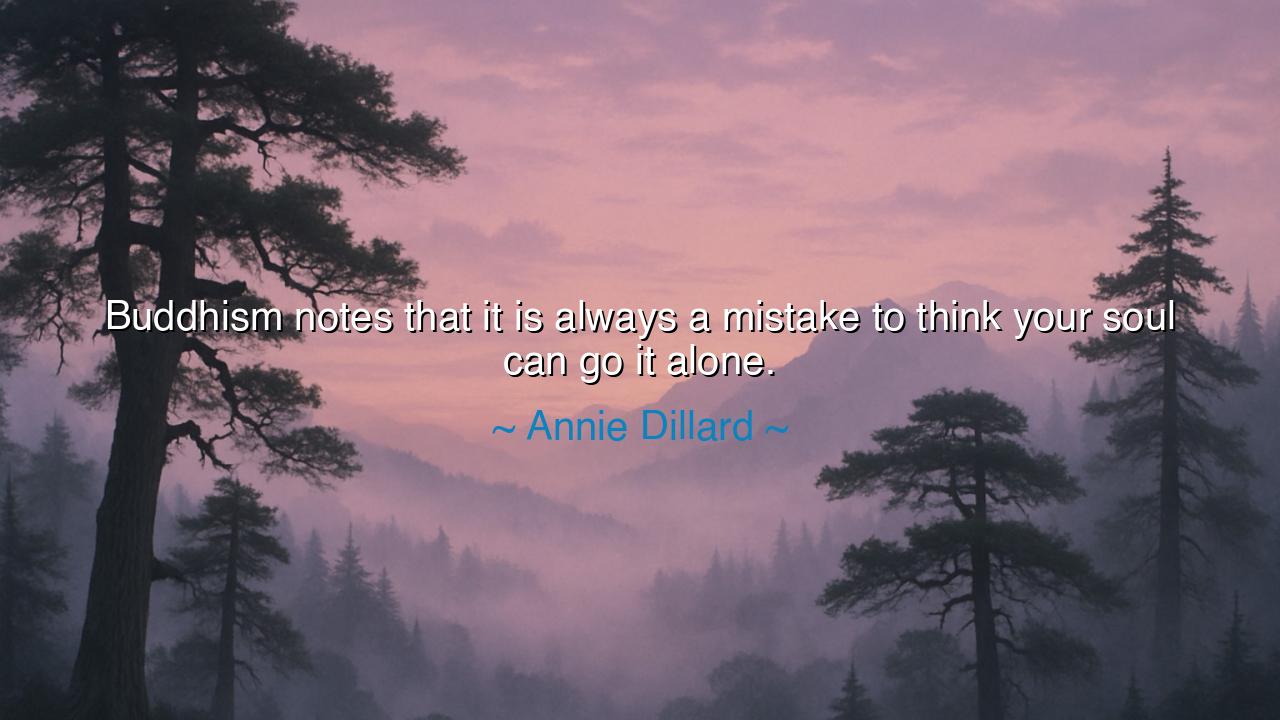
Buddhism notes that it is always a mistake to think your soul can






“Buddhism notes that it is always a mistake to think your soul can go it alone.” — thus wrote Annie Dillard, a seeker of beauty and mystery, whose words rise like incense from the stillness of contemplation. In this saying, she draws upon the ancient wisdom of Buddhism, which teaches that no being exists in isolation, that all life is woven together in an infinite web of interdependence. To imagine that the soul can stand apart, self-sufficient and untouched, is to forget the truth that breath, thought, and being are shared. We live because the world lives; we rise because others lift us. The soul that tries to “go it alone” walks not toward freedom, but toward illusion.
From the beginning, Buddhism has taught the doctrine of interbeing — that all things arise together, and nothing exists by itself. The Buddha, in his wisdom, saw that suffering springs from the illusion of separation. When man believes himself to be alone, when he imagines that his joys or sorrows are his and his alone, he builds walls within the heart. But when he awakens, he perceives that self and other are not two, that the flower depends on sunlight, that the river depends on rain, that the breath he draws has passed through countless lungs. Thus, humility and compassion flow naturally from this understanding, for in aiding others, we are merely tending to our own vast body — the living whole of existence.
Annie Dillard, in her contemplative prose, saw in the natural world what the monks of Asia had long known: that every being is part of an unseen communion. When the bird sings, the forest answers. When one creature falls, another is nourished. She recognized that the illusion of independence — the belief that one can walk the spiritual path alone — is the root of much modern emptiness. Her quote is not merely religious but profoundly human. It reminds us that solitude, though sacred, must never become isolation, and that the soul, like a flame, burns brighter when it shares its light.
Consider the story of the Buddha and Ananda, his faithful disciple. Near the end of his life, Ananda, grieving that his master would soon pass away, said, “Surely companionship in the holy life is half of the path.” The Buddha turned to him and replied, “Say not so, Ananda. Say rather that it is the whole of the path.” For even enlightenment, the highest goal, cannot be reached in solitude — it blooms through compassion, through the mirror of relationship, through the hands that serve and the hearts that understand. In this teaching lies the same truth Dillard saw: the soul that seeks only its own salvation will find itself wandering in circles.
To think the soul can go it alone is the temptation of pride — the belief that we are self-made, self-sustained, self-pure. Yet life refutes this at every turn. The child needs a mother’s breath, the tree needs the unseen mycelium beneath the earth, and even the mountain needs the slow embrace of the sky to shape its crown. The wise see that dependence is not weakness but the law of existence. The wind needs the valley through which it moves; the heart needs another heart to awaken its compassion. To deny this is to deny the sacred rhythm of life itself.
This truth is not limited to monks or mystics. Look to the life of Mother Teresa, who served the dying in the streets of Calcutta. Though small and frail, she drew strength from the countless souls who prayed with her, from the hands that worked beside her, from the eyes of the poor that reflected the face of God. She did not stand alone; she was sustained by the living chain of love. And because she knew that her soul could not go it alone, her work became a river of mercy that nourished millions.
The lesson, then, is clear and eternal: we are one another’s breath. No man, no woman, no spirit stands apart. To seek meaning without relationship is to walk in shadow. When you feel lost, look for the light that others carry; when you are strong, let your light guide those who stumble. Build community, practice compassion, listen deeply, and remember that every act of kindness ripples through the fabric of being. The soul grows not by withdrawal, but by connection — not by turning inward forever, but by joining hands across the great web of life.
So when you find yourself tempted to retreat into the fortress of self, remember Annie Dillard’s quiet warning and the Buddha’s eternal truth: the soul cannot go it alone. You are part of the whole, a note in the symphony of existence. To live wisely is to play your note in harmony with all creation — to breathe with the world, to love without boundaries, and to walk the path not as a solitary pilgrim, but as a companion of all living things.






AAdministratorAdministrator
Welcome, honored guests. Please leave a comment, we will respond soon